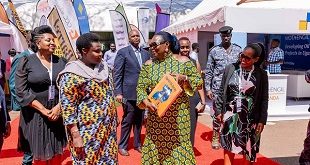
By Isaac Mufumba
On Sunday June 7, Prince Edward Columbus Wambuzi, backed up by three of Busoga Kingdom’s 11 hereditary chiefs, a host of musclemen called Kanyamas and some followers from his native Bulamogi County, installed himself as Isebantu Kyabazinga of Busoga when he took the crown from the head of the royal clans, the Ssabalangira, and crowned himself.
Wambuzi’s ascent to Busoga’s crown in some ways compares to France’s Napoleon Bonaparte about two centuries ago. On December 4, 1804, Napoleon, rather than wait for Pope Pious VII to crown him, took the crown, placed it on his head and declared himself Emperor. However, Napoleon became Emperor following a plebiscite that was not as contested as Wambuzi’s election October 31, 2008.
Busoga Kingdom has 11 chiefdoms headed by princes. These are, according to the kingdom’s constitution, mandated to elect the Kyabazinga.
Opposition to Wambuzi stems from an alleged 1996 compromise engineered by then vice president Speciosa Kazibwe and other Busoga politicians.
At the time, Wambuzi’s father was facing challenges to his aspirations to be king from princes who claimed that the Busoga kingship is rotational among chieftains. As a compromise, the 11 royal chiefs and clan leaders reportedly agreed that Wambuzi’s father becomes Kyabazinga and the other chiefs wait their turn in the queue. The princes claim Wambuzi’s father’s death signified the point at which the kingship should rotate but Wambuzi insists there was no such agreement. The case is before court. Wambuzi, however, went ahead and crowned himself.

Two days after he installed himself, Wambuzi’s main rival, William Gabula IV and other ‘˜rebel’ chiefs held a major rally at the region’s main open-air meeting ground, the Busoga Square.
The public was euphoric. Instead of prostrating before Prince William Gabula IV, who has since become the all powerful symbol of opposition to Wambuzi, some of them prostrated and begged him to walk on their backs on the way to his seat. No cultural leader in Busoga’s history has been the subject of such a public show of affection. The rally was a major public relations’ coup.
Six out of the eleven chiefs who elect a Kyabazinga, namely James Christopher Mutyaba Nkono (Bukono), William Gabula Nadiope IV (Bugabula), Patrick Izimba Gologolo (Kigulu), Juma Munulo (Bunha), Daudi Kawunhe Muluya (Bukooli) and Fred Kakaire Menha (Bugweri) attended.
This implied that Gabula enjoyed his peers in the hereditary chief’s council and the public, but what could have caused the shift away from Wambuzi who on October 31 had also had six of the chiefs on his side?
Some Basoga believe that Prince Wambuzi should pay for the ‘˜sins’ of his dead father, Henry Wako Muloki. Cardinal among those ‘˜sins’ is the shabby manner in which Muloki routinely sacked the kingdom top officials, including the katukkiros or prime ministers.
Save William Kiwagama who resigned in 2001 after he won the Bunya East parliamentary seat, none of the other former premiers was allowed a dignified exit. Each of the sacked premiers still commands a following in Busoga. They and their supporters remain angry. Following his sacking on June 11, 2008, Prof. Juma Wasswa Balunywa, blamed his woes on one factor that seems to be common in all previous sackings – Muloki’s children. This explains why no other former Premier except William Kiwagama backs Wambuzi’s bid for the seat of Kyabazinga.

Secondly, for some time now, a quiet but intense struggle has been raging as people from ten out of the eleven hereditary counties of Butembe, Luuka, Bugabula, Bugweri, Bukono, Kigulu, Bunhyoli, Bunhya and Bukhooli to break Bulamogi’s County’s dominance of the politics and culture of Busoga, which started on February 11, 1996 when Henry Muloki was installed as the Kyabazinga.
By the end of 2005, five of the region’s 29 MPs had their origins in Bulamogi. These include Ruth Tuma, Nelson Gagawala Wambuzi, James Kubeketerya, William Kiwagama and Dr. Frank Nabwiso.
The Mayor of Jinja then, David Wakudumira and the LCV Chairman of the same district also had their origins in the same county. They were fiercely fought during the 2006 elections. Only MPs Ruth Tuma, Nelson Gagawala Wambuzi and James Kubeketerya survived.
In the kingdom circles, all pretensions of constituting cabinets to give a fair share to all counties were abandoned by Wambuzi’s father. The result was that by August 2008, most of the key positions in the kingdom were occupied by people from Bulamogi.
They included Premier Wilson Muwereza, Deputy Premier William Kasango, Lukiiko Speaker Alfred Mugoda and Ministers John Peterson Basalirwa, John Kadogo and Ahmed Noor Osman who has since resigned.
For many, Prince Wambuzi is not only one more Mulamogi too many, but also a symbol of the county’s dominance, which many would like to end.
Unfortunately, this dominance has with time resulted into arrogance manifested in statements deemed inflammatory.
On the night of June 11, a politician from Bulamogi told mourners at the vigil of businessman Ashraf Muhammad’s mother that those opposed to Prince Wambuzi would have to pay a heavy price to rid them of his candidature.
Condemnation of such talk was swift and brutal. The politician withdrew his comments, but his comments have since raised serious questions. Should Busoga be paying Muloki’s son and heir hefty sums of money simply to get him off its back? What would that kind of payment be? Would it be gratuity or a ransom?
Last is the Museveni factor. According to two separate interviews given by kingdom officials, the minute it became clear that Henry Wako Muloki was terminally ill, Museveni started positioning himself to have a say in the succession.
‘This was primarily because of fear of having a Kyabazinga who is sympathetic to the opposition as the 2011 elections draw near,’ says one of the officials.
Wambuzi’s reliance on the strength of his Kanyamas and mysterious gun wielding men whose mission in Busoga and their increased interference in what should be a cultural matter, fuel speculation of Museveni’s involvement.
President Museveni’s Press Secretary, Tamale Mirundi dismisses the claim.
‘Why should a government have a hostile Kyabazinga? People forget that the presence of cultural leaders like the Kyabazinga is a product of the NRM revolution. If the President fears a hostile cultural leader he can simply abolish the cultural leader and his institutions,’ he said in an interview.
Nevertheless, claims that Museveni has since August 2008 exhibited more than casual interest in Busoga’s affairs persist. On August 11, 2008 he hosted the 11 hereditary chiefs and other kingdom officials at State House Entebbe and not only gave the chiefs ‘˜golden handshakes’, but also promised to financially support them to develop their areas in return for their continued support.
Some people at the meeting told The Independent that the support that Museveni expected of them was their agreement with his choice once it was time to determine Muloki’s successor.
On Sept. 8, 2008 during Muloki’s burial, the President promised to support the fallen Kyabazinga’s successor, but again according to the officials, this support was never confined to administration of the estate, but also in ensuring that one of the Muloki sons takes over the throne after his father.
This, according to the officials, explains the presence of soldiers backed up by Jinja DISO, Andrew Nuwabiine, at Wambuzi’s controversial election on Oct.31, 2008 and the support that he got from six of the eleven chiefs.
‘It also explains why (Jinja) Deputy RDC, Apollo Bwebare, was quick to say that government recognises Prince Wambuzi as the rightful Kyabazinga and that no one else should go around calling himself the Kyabazinga,’ says one of the officials.
Since Wambuzi’s controversial election, the President has met traditional and political leaders of Busoga on at least three occasions. At the meetings, it was generally agreed that Wambuzi is not the Kyabazinga and that all legal suits be withdrawn from court to pave way for fresh elections. Implementation of the agreed action points has never been undertaken thus prolonging the impasse.
Despite the President’s effort to right what went wrong on October 31, 2008 the suspicion that his efforts are aimed at helping Prince Wambuzi to the seat continue to grow.
It is claimed that Museveni is opposed Prince Gabula’s bid because of suspected links to the opposition Forum for Democratic Change (FDC) whose leader, Col. Dr. Kiiza Besigye, was in 2001 warmly received in Budhumbula Palace and given a symbolic shield and a spear to use to oust President Museveni.
But Mirundi dismisses this too.
‘The President isn’t interested in any candidate. He is not interested in who becomes a Kyabazinga. He can give advice, but he can not impose a Kyabazinga on the people of Busoga’ he insists.
As the battle over who becomes Busoga’s next Kyabazinga rages on, one cannot help, but remember a common saying among the Basoga who brew a banana wine called tonto or mwenge bigere.
‘Omwenge bwegufa n’omugenge asena’ (When the wine goes bad even lepers can wine without hindrance). Simply put, anyone can lay claim to anything that has lost its intrinsic value. This seems the case with the Kyabazingaship today. Suddenly, while the two most credible candidates, Wambuzi and Gabula are opposing each other, including those whose unworthiness should be self-evident, are laying claim to the Busoga kingdom throne.
In the ensuing melee, former Busoga Prime Minister Keith Mutengu’s words to Museveni at a July 25, 1993 ceremony ring true.
There is need to exploit a faithful capacity and voluntary will to unite ourselves under a recognizable, acceptable and progressive social-cultural leadership. Short of this we are first turning into a mediocre or even substandard ethnic community that could easily and inevitably be relegated to the lowest rungs of national leadership’.
A few days shy of the 16th anniversary of the date when Busoga united under the Obwa Kyabazinga, the institution appears bent on relegating the Basoga to the mediocre or substandard ethic community that Mutengu feared.
 The Independent Uganda: You get the Truth we Pay the Price
The Independent Uganda: You get the Truth we Pay the Price


